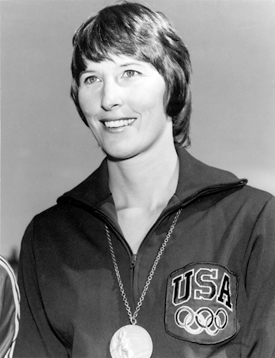The story of Micki King, who won a gold medal in diving in 1972 in Munich after breaking her arm at the 1968 Olympics, captivated many sports fans.
Johnny Carson invited her to appear on his late-night television show. In front of cameras Carson took a diving lesson from King’s coach Dick Kimball, the longtime U-M diving coach.

Micki King won a gold medal in diving at the 1972 Olympic Games in Munich. Photo courtesy Bentley Historical Library.
Her story opens in the 1950s on Oakland County’s Cass Lake in Michigan. King and her family loved to spend summers there, and she loved to swim. Back in Pontiac, her parents signed her up to swim at the local YMCA — women were allowed to swim on two days each week — and King couldn’t wait.
“When I walked in there was this total consuming odor of chlorine, the place was antiseptic, I could see to the bottom of the pool. My first emotion is it’s boring – it’s square and clean and smells funny. That’s what really drove me to diving board on the end of the pool, I thought that was fun.”
King and her friends made up dives. “It wasn’t until I was 15 that one of the lifeguards introduced us to some of the formalities of diving,” she says.
In high school, King began competing and winning amateur competitions. Her mother encouraged her to attend U-M because of diving coach Kimball. The university didn’t have a women’s diving team, but Kimball worked with women students in the Ann Arbor Swim Club, who competed in AAU matches. “My folks realized this was the key to me getting better,” she recalls.
“From that first day he started telling me things I never heard before, like where to put your hands when you swing for your somersault. He was an expert,” she says.
King graduated from U-M in 1966. She pursued a career in the U.S. Air Force, which allowed her to train in Ann Arbor with Kimball for the 1968 Olympics in Mexico City.
At those Olympics, she was leading the women’s diving competition when she prepared for her next to last dive.
“I just was tentative on it, I knew the minute I started walking on the board I was too cautious,” King says. “I realized that I was leaning back on my takeoff. That was going to put me close to the board. My dive was going to be subpar.
“To make it be a judgeable dive I had to put my arms up to slow my rotation down and extend,” she says. “I hit the board with my left arm.”
King says the irony is that this dive looked successful, and that only two of the seven judges spotted that she had hit the board. As she climbed from the pool, she was in pain and felt faint. Trainers iced the forearm and gave her smelling salts.
She wasn’t discouraged. “I said, ‘Let’s just hit this (final) dive and we’ll deal with the arm later. It was my signature dive so I was ready for it and eager for it, I knew this would win it for me,” she recalls.
But when she went to wrap her arms into a twist action, she wasn’t prepared for the pain and lost her concentration. “I landed the dive badly and I knew it, I have to climb out of the pool knowing I blew it,” King says. “Within 10 minutes they’re awarding the gold medal to someone else.” She learned the next day that her arm was broken.
The following summer, King was an Air Force lieutenant stationed in Los Angeles. She went to Long Beach to watch a national swimming-diving competition, and watched competitors she had defeated in past meets.
“Living with that mistake that cost me that medal was hard,” she says.
Kimball said he’d coach her again if she wanted to make a comeback. She did, training on her off-duty time, and returning to Ann Arbor to train with Kimball in the months leading up to the 1972 Olympics. She performed well and made it to the finals, but wasn’t in the lead as she was four years before.
“Coach Kimball said something I never heard him say before. He said, ‘If you’re behind a couple two-three points going into the last three dives, that’s OK.’ He had never given me permission to be behind.”
She says Kimball then pointed over her shoulder to the two teenagers from Sweden who were leading the competition, being interviewed on television. As they faced the questions, King chose to take a break and get something to eat.
Her first dive went well. For her second dive — in contrast to 1968 — King chose an easier reverse one-and-a-half tuck dive, which offered fewer points but was more likely to be successful. “I could have done it blindfolded,” she says.
Breaking the water after her final dive, King knew she had won the gold.
“I touched my arm on the bottom of the pool and said, ‘Yes! Yes!,’ then I popped up out of the water and looked over at Coach Kimball with his arms up in the air. My emotion was, ‘Wow, my dream has come true.’”
Now a retired Air Force captain in Lexington, Ky., King says she couldn’t have achieved her Olympic dream without U-M — which didn’t have a women’s program when she was a student — and Kimball.
“Michigan today is one of the few schools that fully complies with federal law (Title IX). Michigan has come full circle and I’m proud of that,” she says.
The cast in which King’s broken arm was set now is enshrined in the International Swimming Hall of Fame in Fort Lauderdale, Fla.

